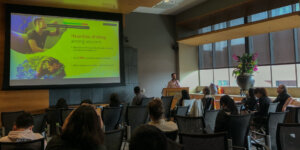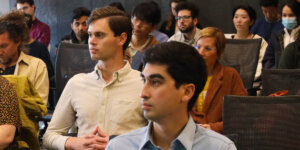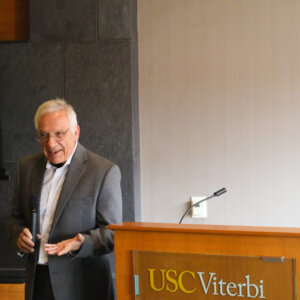
ShowCAIS 2023 focuses on using AI for good to address a number of social issues
AI is often seen as a tool for innovation and productivity, but its potential to make a positive impact on society is often underestimated. However, the USC Center for AI in Society (CAIS) is leading the charge in demonstrating how AI can be leveraged to address some of the most pressing social issues of our time.
USC CAIS recently hosted ShowCAIS, a one-day event that brought together more than 100 students and faculty from seven different USC schools to present their research using AI for good. Held in person for the first time ever, presentations at the event focused on a range of projects tackling issues like equity, healthcare, homelessness, LGBTQ+ marginalization, conservation and disaster response. As a pioneering partnership between the USC Suzanne Dworak-Peck School of Social Work and the USC Viterbi School of Engineering, USC CAIS has been at the forefront of leveraging AI for social good since its founding in 2016, long before the recent AI boom.

A presentation at the 2023 ShowCAIS event
To fully harness the capabilities of AI technology, Eric Rice, co-director of USC CAIS, whose research focuses on homelessness, says it’s critical to unite individuals working with AI across different fields. “AI is no longer exclusive to computer scientists,” said Rice, a USC Dworak-Peck professor of social work. “While they do contribute heavily to its development, there are groups of people from different schools who are also delving into this field. I believe that convening these individuals with diverse academic backgrounds into a single platform to engage in dialogue with one another could significantly magnify our influence and collective impact.”
The event was a great success which attracted participation from the Viterbi School of Engineering,Suzanne Dworak-Peck School of Social Work, Sol Price School of Public Policy, Annenberg School for Communication and Journalism, Alfred E. Mann School of Pharmacy and Pharmaceutical Sciences, and Marshall School of Business. It included presentations from twelve faculty and forty-one students, including undergraduate, masters, and PhD students.
“Many of the projects featured in ShowCAIS highlight creative and innovative ways in which AI can be leveraged to try to make a positive impact, particularly in addressing social issues. This is important for us to understand the many ways in which we can connect our technology tools to the real world in a positive way,” said Bistra Dilkina, co-director of USC CAIS, and a USC Viterbi associate professor of computer science and industrial and systems engineering. During the symposium, Dilkina presented her latest research on using AI for conservation efforts.

Attendees of ShowCAIS 2023
Nathan Justin, a Ph.D. student studying computer science at USC Viterbi School of Engineering, conducts AI fairness research with applications across multiple fields. “This showcase event gave me the unique opportunity as an engineer to share my work with social scientists that may be able to use my technology for their own applications or come up with new ideas on how to use that theory for their own work,” Justin explained. “I love to hear from the social sciences side on what problems they’re facing that may have engineering and AI solutions.” He and Graham DiGuiseppi, a Ph.D. student studying social work at USC’s Suzanne Dworak-Peck School of Social Work, played a key role in organizing the symposium with Dilkina and Rice.

USC Viterbi Dean Yannis Yortsos at ShowCAIS 2023
DiGuiseppi presented his research at ShowCAIS and said, “At ShowCAIS I had the opportunity to present one of my dissertation studies where I used machine learning analysis to predict homelessness among young adults who are entering substance abuse treatment.”
Leadership from around the University spoke at the event, offering their thoughts about the importance of AI in society.
“I believe that we are in a transformative moment with respect to AI,” said USC Viterbi Dean Yannis C. Yortsos. “There are many interesting aspects of it that are both positive and potentially negative, too. We have to make sure we take an ethical and moral position in AI, and CAIS is a very important element in doing that.”
Dean Vassilios Papadopoulos of the USC Suzanne Dworak-Peck School of Social Work and Alfred E. Mann School of Pharmacy and Pharmaceutical Sciences, and Suzanne Wenzel, USC Dworak-Peck associate dean for research, also shared words of encouragement with attendees while praising CAIS’ visionary research using AI to solve some of the world’s most pressing challenges.
At ShowCAIS, USC CAIS emphasized that despite being an artificial technology, AI has the potential to create a genuine and positive impact on society. Ishwar K. Puri, USC senior vice president of research and innovation, drove that point home by challenging those in attendance to conquer the potential negative impacts of AI by using their courage and creativity.
“AI is here,” said Puri. “It’s already transformed our lives, and going forward, it’s going to transform our lives even further. We can sit around and rue the moment when AI came, or you can be the agents of change, which takes courage and creativity.”
Published on April 28th, 2023
Last updated on November 27th, 2024







